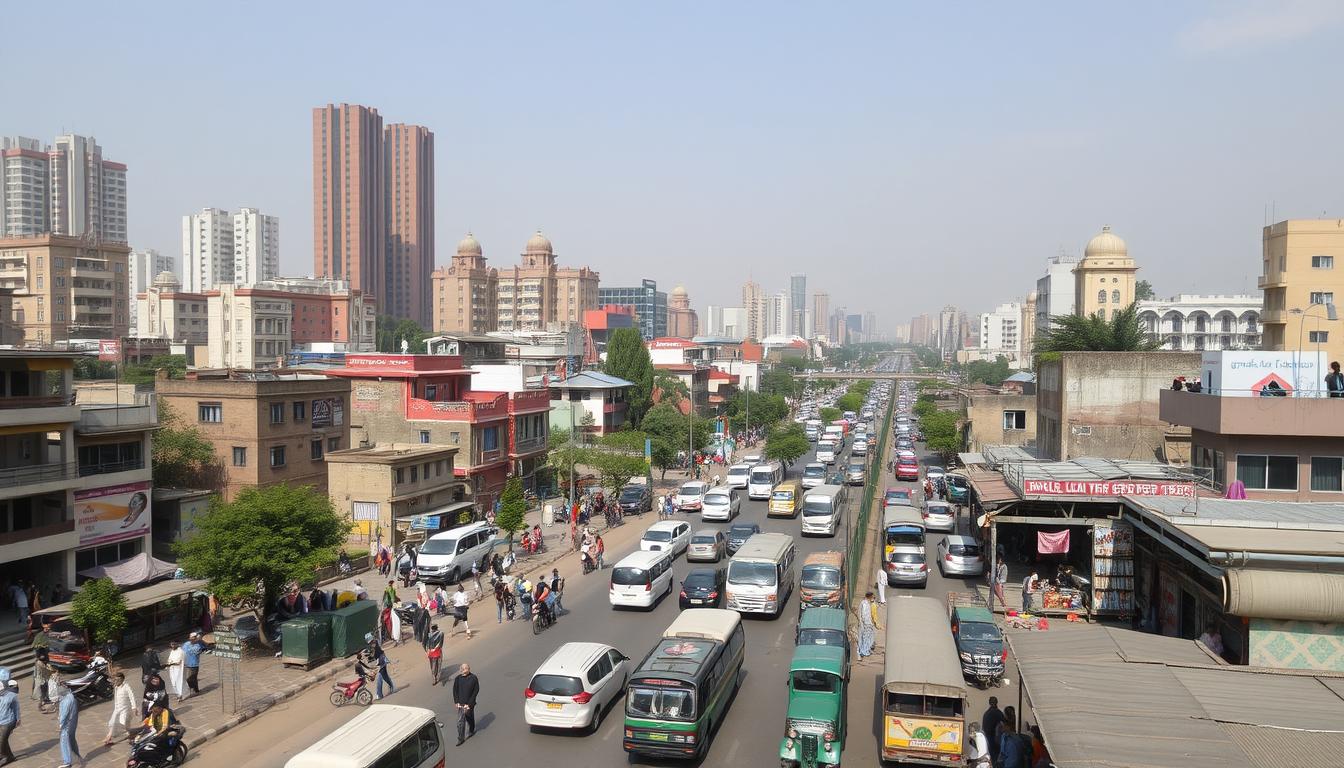Urbanization in Pakistan is changing fast, affecting people’s health. More people are moving to cities, bringing new health challenges. This article looks at how urbanization impacts physical health in Pakistan. It also explores ways to improve health in growing cities.
Key Takeaways
- Urbanization in Pakistan has led to rapid population growth in cities, straining urban infrastructure and services.
- Air pollution from industrial and vehicular sources is a major contributor to respiratory diseases like asthma and COPD.
- Sedentary lifestyles and lack of recreational spaces in urban areas have increased the prevalence of obesity and related chronic conditions.
- Disparities in healthcare access and quality pose significant challenges for addressing physical health issues in urban populations.
- Promoting sustainable urban planning and policies is crucial for mitigating the negative health impacts of rapid urbanization.
Understanding Urbanization in Pakistan
Pakistan has seen a big increase in urbanization over the last few decades. More people are moving from rural areas to cities for better jobs and services. But, this fast growth brings big health challenges.
Rapid Population Growth in Cities
The number of people in cities is growing fast, faster than cities can keep up. Cities like Karachi, Lahore, and Faisalabad are getting very crowded. This makes finding affordable homes, clean water, and good transport hard.
Challenges of Urban Infrastructure Development
The fast growth of cities in Pakistan shows the need for better planning and infrastructure. Many cities lack basic things like clean water and reliable power. The lack of investment in urban infrastructure makes living conditions worse, leading to health problems.
Also, the poor transport system and too many private cars cause more air pollution. This harms the health of city people. To fix these issues, we need a new approach to city planning and building, focusing on health and sustainability.
“The rapid growth of cities in Pakistan has outpaced the development of essential urban infrastructure, leading to a range of challenges that ultimately impact the physical health of the population.”
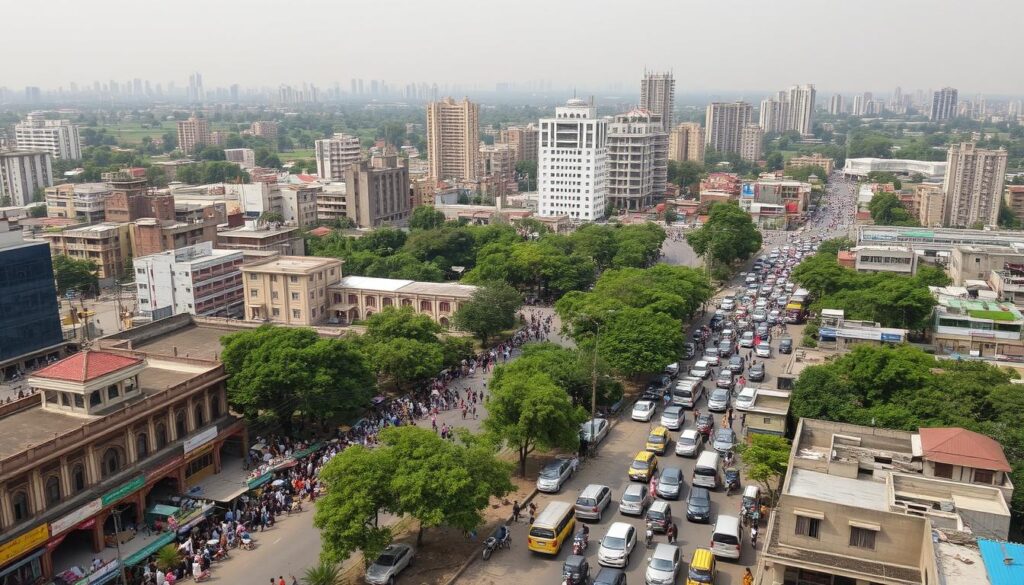
Physical Health Implications of Urbanization
More Pakistanis are moving to cities, affecting their health. Moving from rural to urban areas changes lifestyles and exposure to the environment. This impacts their overall health.
Non-communicable diseases like cardiovascular disorders and type 2 diabetes are on the rise. Sedentary lifestyles and unhealthy diets in cities contribute to this. Air pollution in cities also increases respiratory diseases, including asthma and chronic obstructive pulmonary disease (COPD).
“The transition from rural to urban living has brought about significant changes in people’s lifestyles and exposure to various environmental factors, directly influencing their overall well-being.”
Urban areas often lack physical activity and recreational spaces. This leads to more obesity and related health issues. These changes, along with environmental factors, require a broad approach to public health.
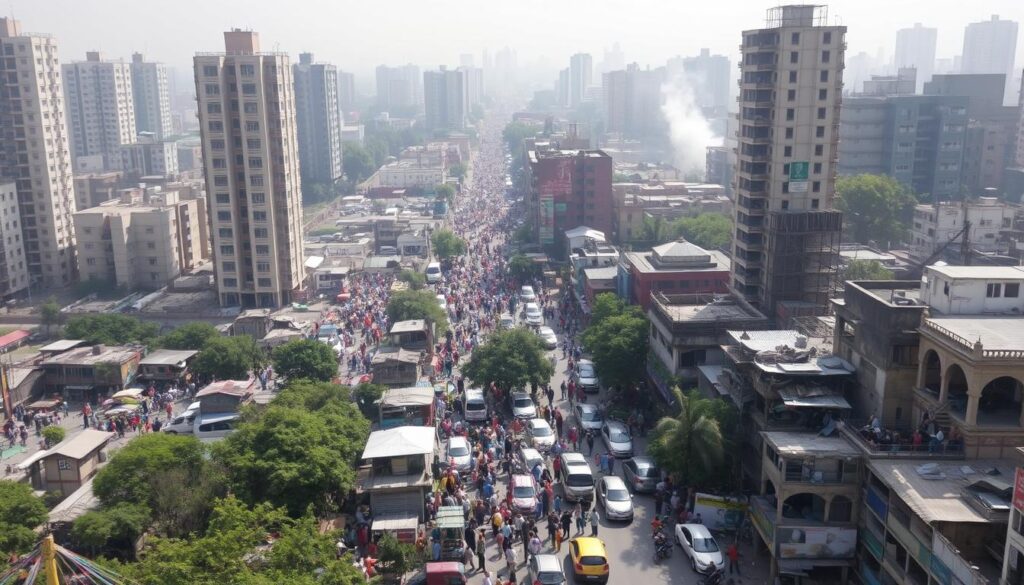
Urban planners and policymakers must focus on creating healthy cities. They should improve air quality and increase green spaces. They should also encourage active lifestyles through design and awareness campaigns. By tackling these issues, Pakistan can enhance the health of its urban residents.
Air Pollution and Respiratory Diseases
Urbanization in Pakistan has led to a big health problem: air pollution. This pollution harms our lungs and increases diseases like asthma and COPD. Cars, factories, and other sources make the air worse.
Sources of Air Pollution in Urban Areas
The main causes of air pollution in Pakistan’s cities are:
- Cars, trucks, and buses release harmful gases.
- Factories and power plants also pollute the air.
- Construction and demolition projects create dust.
- Burning waste and biomass for cooking and heating is harmful.
Prevalence of Asthma and Chronic Obstructive Pulmonary Disease
Poor air quality has made respiratory diseases more common. A study found asthma rates up to 15% in cities, and COPD at 7.6%. These diseases can greatly reduce one’s quality of life, causing many health issues.
“Addressing the environmental factors that contribute to air pollution is crucial for safeguarding the long-term physical well-being of the population.”
To fight these diseases, we need to clean the air. This can be done by using cleaner energy, making vehicles less polluting, and controlling industrial emissions. These steps are key to improving health in urban Pakistan.
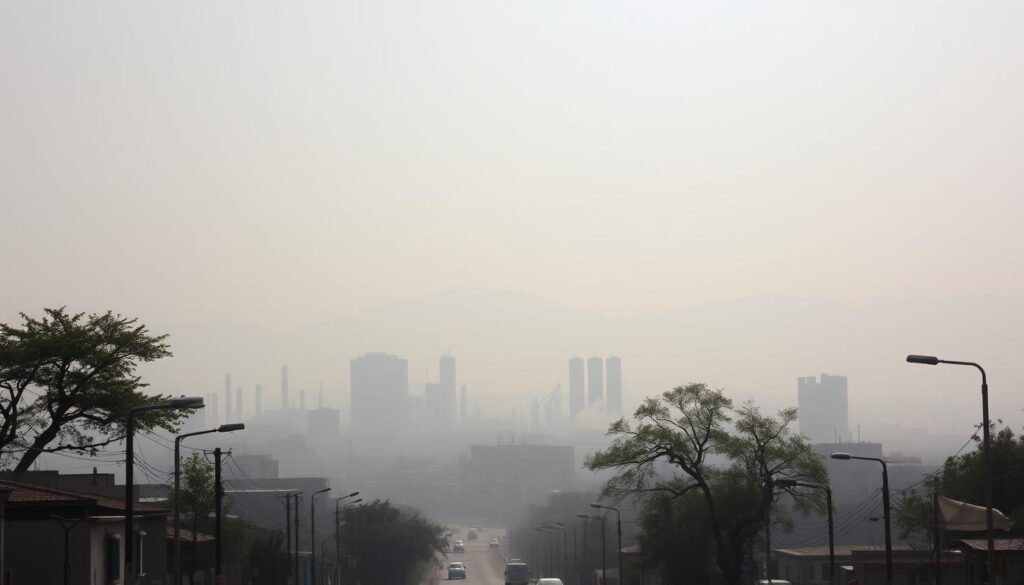
Inadequate Physical Activity and Obesity
The move to cities in Pakistan has led to less physical activity. People now spend more time sitting, which has caused obesity and health issues to rise.
Sedentary Lifestyles and Lack of Recreational Spaces
There’s a big problem: not enough places for people to be active. Cities in Pakistan haven’t focused on making spaces for exercise. This leaves people with few ways to stay active.
Now, sitting for long times and using screens too much is common. This has changed how people live, making them less active. This change has hurt people’s health, leading to more obesity and health problems.
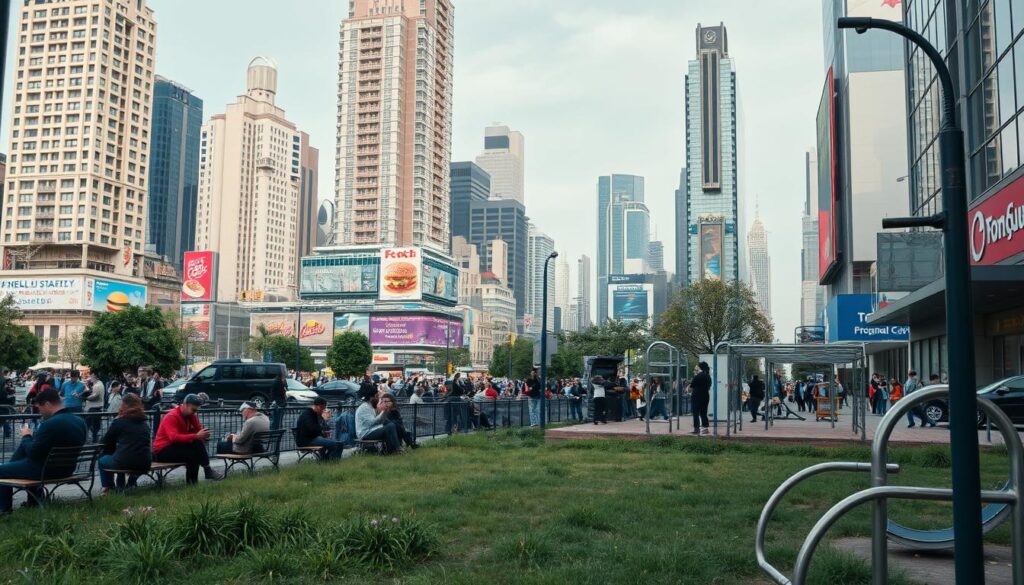
“Promoting active living and creating urban environments that encourage physical activity are crucial for addressing this growing concern and improving overall physical health outcomes.”
To fix this, we need a plan that involves everyone. We must design cities with more parks and places for walking. We also need to make policies that help people be more active and healthy.
Mental Health and Stress-Related Disorders
Urbanization in Pakistan affects more than just physical health. It also impacts mental health. The stress of living in cities, like overcrowding and job insecurity, can lead to mental health issues. It’s important to help urban residents get the support they need for their mental well-being.
Stress is a big problem in cities. The fast pace and high pressure can make people feel overwhelmed. This can lead to anxiety and depression. Without access to mental healthcare, these problems can get worse.
Urban living also affects mental health in other ways. Lack of social connection and green spaces can harm mental well-being. These factors can lead to stress-related disorders like PTSD and burnout. These conditions can greatly affect a person’s health and happiness.
To tackle mental health issues in cities, we need better mental healthcare access. We should make counseling, therapy, and medication more available. We also need to work on reducing the stigma around mental health and encourage people to seek help early.
By focusing on mental health in urban areas, we can improve the lives of city residents in Pakistan. Effective strategies can help address stress-related disorders. This way, we can make cities better places to live.
Physical Health and Access to Healthcare
Urbanization in Pakistan has shown big gaps in getting quality healthcare. Cities have better medical facilities, but not everyone can reach them. Poor communities and those with less money struggle to get healthcare access and healthcare quality.
Disparities in Healthcare Access and Quality
The gap between cities and rural areas in Pakistan is huge. Cities have more hospitals and clinics, but rural areas lack basic care. This socioeconomic disparity leads to worse health for those in rural areas.
To fix this, we need to make healthcare fair for everyone. We must improve healthcare in rural and poor urban areas. This will help everyone in Pakistan stay healthier.
“Equitable access to quality healthcare is a fundamental human right and a key driver of a healthy, thriving society.”
Dietary Changes and Nutritional Challenges
Urban living in Pakistan has changed how people eat. Now, fast food and processed foods are everywhere. This has led to more cases of diabetes and obesity.
Shift Towards Unhealthy Food Choices
More people in Pakistan are choosing fast food and processed foods. These foods are full of calories, fat, and sugar, but lack important nutrients. This change in diet is bad for health, raising the risk of chronic diseases like diabetes and obesity.
Impact on Chronic Diseases like Diabetes
The rise in unhealthy food choices and a more sedentary lifestyle has worsened the health situation in urban Pakistan. Diabetes is a big problem now, with serious complications affecting many people.
To tackle these nutritional challenges, we need public health interventions. We must encourage healthy food options and teach people about the value of balanced diets. This is crucial for keeping Pakistanis healthy.
“The shift towards unhealthy dietary habits in urban Pakistan is a growing concern, with far-reaching implications for the health and well-being of the population. Addressing this challenge requires a comprehensive approach that promotes nutrition and dietary habits that support long-term physical health.”
Role of Urban Planning and Policies
To tackle the health issues of urbanization in Pakistan, we need a big plan. This plan must include urban planning and public policies. It’s important to make cities healthier, support sustainable development, and work together across different fields.
Urban planning shapes our cities and affects our health. By focusing on healthy urban environments, we can make sure everyone has access to parks, gyms, and safe streets. Also, using green buildings and good public transport can reduce pollution and encourage people to move more.
Strong public policies are key to solving urban health problems. Health-centric policies can improve air, encourage biking and walking, and make healthcare affordable. Working together, experts from different fields can create effective plans to tackle urban health issues.
Fostering a collaborative approach between urban planning and public health is crucial for creating healthy urban environments that support the physical well-being of the Pakistani population.
By combining urban planning and public policies, Pakistan can make cities better for health. This will help in promoting sustainable development and ensuring health-centric policies for its growing cities.
Physical Health: A Critical Concern
Urbanization in Pakistan has become a major public health issue. It affects the physical health of many people. Cities growing fast has led to more respiratory diseases, obesity, and unequal access to healthcare.
Air pollution is a big problem in cities. It causes more asthma and lung diseases. We need better policies and urban planning to solve these health problems.
Also, people are not moving as much because of less space for fun. This has made obesity and diabetes more common. It shows we must work on preventive care and fairness in health across Pakistan’s cities.
To tackle these issues, we need a complete plan. This plan should include public health efforts, policy changes, and making cities better for living. By doing this, Pakistan can protect its people’s health and build a fairer future.
- Understanding Urbanization in Pakistan
- Physical Health Implications of Urbanization
- Air Pollution and Respiratory Diseases
- Inadequate Physical Activity and Obesity
- Mental Health and Stress-Related Disorders
- Physical Health and Access to Healthcare
- Dietary Changes and Nutritional Challenges
- Role of Urban Planning and Policies
- Physical Health: A Critical Concern
